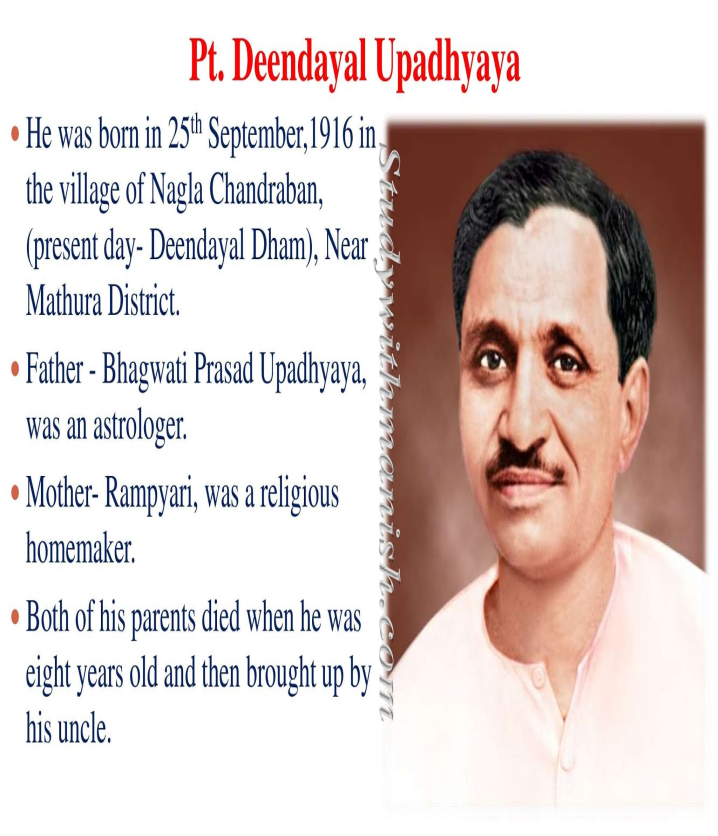Prime Minister’s Tribute to Pandit Deendayal Upadhyaya
Why in the news?
- Prime Minister Narendra Modi paid homage to Pandit Deendayal Upadhyaya on his birth anniversary.
- The tribute was made public on September 25, 2024, through a statement released by the Press Information Bureau (PIB) in Delhi.
- PM Modi highlighted Pandit Deendayal Upadhyaya’s philosophy of Antyodaya.
- The concept emphasises upliftment and empowerment of the poorest sections of society.
Overview of Antyodaya Diwas 2024:
- Event Name: Antyodaya Diwas 2024
- Date: September 25, 2024
- Significance: Commemorates Pandit Deendayal Upadhyaya’s birth anniversary; promotes upliftment of the poorest sections of society.
- Observed By: Government of India, NGOs, social organisations
- Objective: Promote social equality and awareness for underprivileged communities.
- Key Activities: Community service events, workshops, and seminars on poverty alleviation.
- Organising Bodies: Ministry of Rural Development, Ministry of Social Justice and Empowerment.
- Major Schemes: Deendayal Antyodaya Yojana, Antyodaya Anna Yojana.
Concept of Antyodaya:
- Meaning: Derived from Sanskrit, meaning the upliftment of the last person in society.
- Focus: Well-being of the weakest members, ensuring access to basic
Vision for Developed India:
- The Prime Minister asserted that Antyodaya will be crucial in realising India’s goal of becoming a developed nation.
- Modi’s remarks reflect a commitment to inclusive development and social welfare inspired by Upadhyaya’s principles.
Who is Pandit Deendayal Upadhyay?
- Birth: Born in Mathura, UP in 1916.
- Political Role: Key leader of the Bharatiya Jana Sangh, predecessor of the BJP.
- Education: Qualified civil services but chose not to join; became a lifelong volunteer of RSS in 1942.
- Influence: Impacted India’s political thought beyond party lines.
Key Philosophies:
- Integral Humanism: Advocates a classless, casteless society integrating Indian culture with social, political, and economic frameworks.
- Decolonization: Emphasised Indian intellect and adaptation of modern technology for local needs.
- Decentralised Polity: Promoted self-reliance with a village-centric approach and criticised caste-based politics.
- Welfare Focus: Warned against neoliberalism harming democracy, stressing that politics should serve the masses over corporate interests.
Major Government Schemes in His Name:
Deendayal Antyodaya Yojana:
- Integrates NULM and NRLM for poverty alleviation.
- DDU-GKY: Aims to diversify rural incomes and address youth aspirations.
- Gram Jyoti Yojana: Provides electricity to rural homes.
- Shramev Jayate Karyakram: Supports industrial development through skill training.
- Swaniyojan Yojana: Rural version of Start-Up India.
- Antyodaya Anna Yojana: Ensures food security for the vulnerable.
- Pradhan Mantri Awas Yojana: Aims for affordable housing for economically weaker sections.
Sources Referred:
PIB, The Hindu, Indian Express, Hindustan Times




